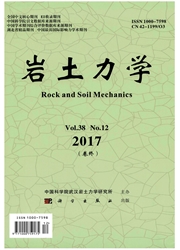

 中文摘要:
中文摘要:
开展原煤在热-力作用下煤热膨胀与吸附瓦斯解吸研究对于深入理解深部煤岩失稳破坏机制有重要意义。通过对四川白皎矿和徐州张双楼矿的原煤施加不同温度-应力条件,获取煤的热变形、解吸气体运移以及煤的力学性质的热响应。试验结果表明:白皎煤在低于35℃条件下表现为膨胀变形;在高于35℃恒温环境下,煤体变形表现为先膨胀后收缩趋势。张双楼煤在低于60℃条件下表现为先膨胀后会出现收缩;在高于60℃恒温环境下,煤样趋向整体膨胀。其结果说明,煤岩在热环境中的变形行为取决于煤基质的热膨胀与解吸收缩之间的竞争结果。煤吸热升温后孔隙中解吸气体数量增多,煤样在受载压缩变形过程中显现出复杂解吸气体排放特征,包括煤中原生孔隙裂隙压缩闭合排出气体,煤体内不均匀变形导致气体流动,煤体开裂导致气体回流。力学测试结果表明,煤样的单轴抗压强度以及弹性模量随着环境温度上升均表现出下降趋势。其结果为深入理解深部煤层在热-力耦合下渗透率与强度变化机制提供试验依据。
 英文摘要:
英文摘要:
When coal is recovered by mining, or fluid recovered or injected, complex interactions of stress, gas sorption and thermal expansion have a strong influence on the mechanical and transport properties of coal. In this study, intact coal with endogenetic gas, collected from Baijiao mine and Zhangshuanglou mines in China, were treated by thermal-mechanical loading under different isothermal conditions. A special apparatus is used to measure mechanical parameters of solid and gaseous products released from specimen. It is observed from thermal deformation-time curves of the coals that both the deformation of coals and associated gas desorption are significantly controlled by applied thermal conditions as expected. The results show that Baijiao coals with highly in-situ gas content tend to swell below 35 ℃. And above 35 ℃, the coals first swell and then shrink. For Zhangshuanglou coals with lowly in-situ gas content, the coals exhibit swell, followed by shrinkage of coal matrix under isothermal conditions below 60 ℃. However, the coals tend to expand on the whole when the isothermal conditions are set above 60 ℃. The results indicate that the coal deformation is dominated by competition between thermal expansion and shrinkage of coal solid by the applied temperature. Meanwhile, more thermal-induced desorbing gas flow into pores and cleats of the coal. In this case, the stressed coal is characterized by complex coal-gas interaction under different isothermal conditions. Existing pore gas may be squeezed out during initial compaction of pore and cleat of coal. Ebb and flow of desorbing gas is observed from elastic deformation to failure. In comparison with the data of the two coal samples, both uniaxial compressive strengths and Young's modulus of the coal samples are found to deteriorate with increasingly temperature conditions. It may help us to gain an insight into temperature dependency of mechanical property of gas-bearing coal.
 同期刊论文项目
同期刊论文项目
 同项目期刊论文
同项目期刊论文
 Adsorption-induced permeability change of porous material: a micromechanical model and its applicati
Adsorption-induced permeability change of porous material: a micromechanical model and its applicati Temperature influence on macro-mechanics parameter of intact coal sample containing original gas fro
Temperature influence on macro-mechanics parameter of intact coal sample containing original gas fro 期刊信息
期刊信息
